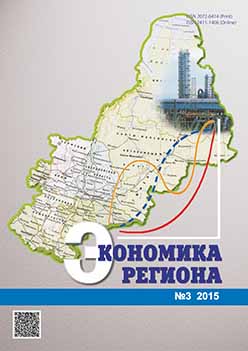Оценка взаимосвязи риска и доходности налоговой системы в регионах России
Correlation Assessment of Tax System Risk and Profitability in the Russian Regions
Author(s): Marina Yuryevna Malkina, Rodion Vladiirovich BalakinSubject(s): Economy, Geography, Regional studies
Published by: Институт экономики Уральского отделения Российской академии наук
Keywords: region; tax revenues; tax burden; the risk of the tax system; standard deviation; correlation coefficient; G. Markowitz portfolio approach; W. Sharpe ratio;
Summary/Abstract: The subject of the article is the risk, returnm and efficiency of the tax systems in the regions of the Russian Federation. Research methods: deflating GRP and tax revenues at regional level; calculating the standard deviations; G. Markowitz portfolio approach; W. Sharpe ratio calculating; correlation and regression analysis. Results obtained: 1) comparative risk profile of various taxes and their groups in the Russian Federation; 2) clustering the Russian regions in terms of risk and return of tax systems; 3) regression between the risk of regional tax systems, relative scale of regional economics and tax return based on panel data of the Russian regions in 2006-2012; 4) ranking of the RF regions on the effectiveness of their tax systems, estimated by W. Sharpe ratio. In the paper, the authors have concluded: 1) all taxes (tax group) collected in the Russian regions demonstrate a positive statistical relationship between return and risk, but with different correlation; 2) the risk of regional tax system depends on the structure of tax revenues in given region, the risks of collected taxes and the covariance of different taxes revenues to each other, and joint effect of these factors is estimated by means of portfolio approach by G. Markowitz; 3) the correlation between return and risk of the tax systems of the subjects of Russian Federation considering the scale of regional economics accounts for 75 %; 4) the risk of the Russian tax system is significantly provided by 19 major high-risk regions with more than 65 share in the total state tax revenues; 5) the effectiveness of regional tax systems estimated by the Sharpe ratio depends on both the objective and subjective factors affecting the yield and volatility of tax revenues in a region. Obtained results can be used by researchers in further dynamic and comparative analysis of regional tax systems’ risk and return, as well as in identifying the reserves for increasing the regional tax policy effectiveness.
Journal: Экономика региона
- Issue Year: 11/2015
- Issue No: 3
- Page Range: 241-255
- Page Count: 15
- Language: Russian

